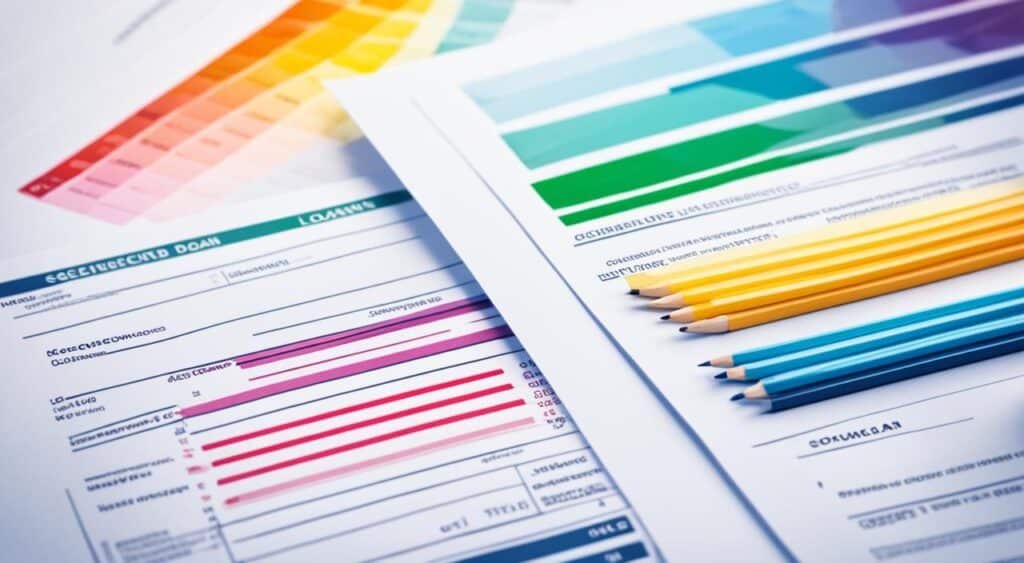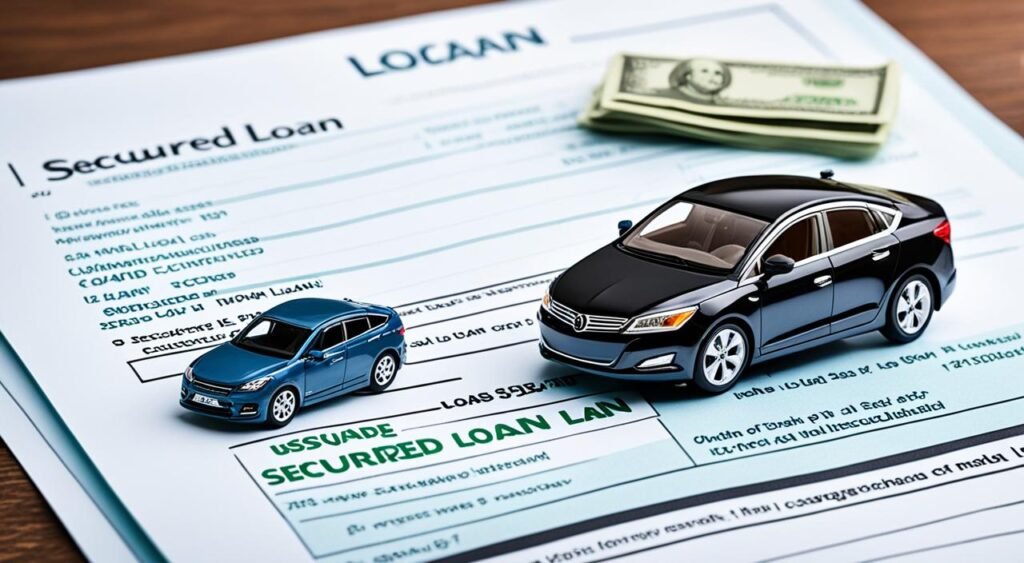Unsecured loans help you borrow money without risking your stuff. Unlike loans backed by a home or car, they don’t need collateral. They’re quicker to get, perfect for small loans, but have higher interest rates and tough credit rules.
These loans are great if you need cash fast or for small projects. You can use them for things like merging debts or covering unexpected costs. If you struggle to pay back, your house or car won’t be taken away.
Key Takeaways
- Unsecured loans don’t require collateral, unlike secured loans
- Advantages include no risk to personal property, faster approval, and smaller loan amounts
- Drawbacks include higher interest rates, shorter repayment terms, and stricter credit requirements
- Unsecured personal loans offer flexible financing for various purposes
- Carefully consider the pros and cons when choosing an unsecured loan
Introduction to Unsecured Loans
Unsecured loans are loans that don’t need collateral to secure them. Unlike secured loans which need assets like a home to back them up, these depend only on the borrower’s creditworthiness. This makes unsecured loans a good option for personal financing without risking one’s personal assets.
Definition of an Unsecured Loan
At heart, an unsecured loan is a kind of personal loan without collateral. The lender checks the borrower’s credit history and income to decide on the loan. They don’t ask for an asset to secure it.
Common Examples of Unsecured Loans
Examples of unsecured loans are student loans, credit cards, and personal loans. These loans let people borrow money without risking their personal stuff. They’re a good choice for various financial needs.
Key Advantages of Unsecured Loans

Unsecured loans are loans that you can get without giving up collateral. They’re great for when you need money fast. This makes them perfect for smaller loan amounts. With these loans, your stuff doesn’t get taken if you can’t pay back the loan.
Fewer worries about losing your stuff make things faster. Unlike with secured loans, your things don’t need to be checked by the lender first. This makes unsecured loans ideal for people who need small amounts of money. It’s a better deal for the lender, so they’re more willing to help out line of credit installment loan online lender.
| Advantage | Description |
|---|---|
| No Collateral Required | Unsecured loans do not require the borrower to provide any personal assets as collateral, reducing the risk of losing property if they cannot repay the loan. |
| Faster Loan Approval Process | The lack of collateral evaluation streamlines the approval process for unsecured loans, allowing borrowers to access funds more quickly than with secured loans. |
| Better for Smaller Loan Amounts | Unsecured loans are generally a more suitable option for borrowers seeking smaller loan amounts, as the risk to the lender is lower in these cases. |
Unsecured Loan
An unsecured loan is a kind of personal financing. It lets people borrow money without giving collateral. Unlike secured loans, which need a house or car as a guarantee, unsecured loans depend on how trustworthy the borrower is. This quality makes unsecured loans a good choice for many personal and financial goals.
Potential Drawbacks of Unsecured Loans
Unsecured loans have their upsides, but they also have some downsides. One big issue is the higher interest rates they carry. These rates are often higher than loans backed by collateral. That’s because, without security, lenders face more risk. So, they charge more to cover that risk.
Higher Interest Rates
The interest rates on unsecured loans are often more costly. This can make paying back the loan harder. You might end up paying a lot more in interest over time. This could cancel out any financial gains from the loan.
Shorter Repayment Terms
Unsecured loans also usually mean you need to pay back the money faster. This is because there’s no collateral to protect the lender. So, they don’t want to be on the hook for a long time. This can make your monthly payments higher and the time to repay shorter.
Stricter Credit Requirements
To get an unsecured loan, you need a strong credit score. Lenders look closely at your credit history, income, and debt-to-income ratio. They do this to evaluate the risk of giving you the loan. If your credit isn’t so great, it might be hard to get or you won’t get good terms.
Borrowers need to think hard about the disadvantages of unsecured loans. These include costly interest rates, shorter repayment terms, and the need for a good credit score. It’s crucial to understand these challenges. This will help you decide if an unsecured loan is right for your financial situation.
Comparing Secured vs. Unsecured Loans
The main difference between secured and unsecured loans is the need for collateral. Secured loans ask for an asset, like a home or car, to back the loan. This asset can be taken by the lender if you don’t repay the loan. Unsecured loans, on the other hand, don’t need any collateral.
Differences in Collateral Requirements
Because secured loans have collateral, the lender is less at risk. This means they can offer lower interest rates and let you borrow more money. Collateral acts as a safety net for the lender, so they give better deals.
Interest Rate Variations
Unsecured loans might come with higher interest rates. This is because there’s no collateral. Lenders have to protect themselves from the risk of not getting their money back. So, they charge more in interest.
Borrowing Limits and Amounts
With secured loans, you can often borrow more. This is because the loan is backed by your collateral. It’s a good choice if you need a lot of money. For smaller loans, unsecured loans work better. There’s less risk for the lender, so they can be more flexible with smaller amounts.
Factors Affecting Unsecured Loan Approval

When you apply for an unsecured loan, your credit score and history are very important. Lenders look at these alongside your income, job status, and how much debt you already have. This helps them figure out if you’re likely to pay back the loan.
Credit Score and Credit History
Your credit score and history really matter in getting approved for an unsecured loan. How well you’ve paid off debts in the past shows how trustworthy you are. People with good credit scores and a history of on-time payments get better loan deals.
Income and Employment Verification
Lenders check your job and income to see if you can pay back the loan. A steady job, good income, and not too much debt all make you a better candidate for a loan. It’s about showing you have the means to make payments.
Debt-to-Income Ratio
Your debt-to-income (DTI) ratio is also key. It looks at your debt compared to your income. A lower DTI is better as it shows you’re not overburdened with debt. This makes lenders more likely to trust you with their money.
Understanding what lenders look at can help you prepare. Work on improving your credit report and managing your finances better. This boosts your chances of getting a good loan offer.
Using Unsecured Loans for Debt Consolidation
Unsecured loans are great for merging lots of high-interest debts, like credit card balances, into one loan. This new loan might have lower interest rates and easier payback plans. It helps people handle their payments better and lower the overall debt interest.
Benefits of Consolidating Debts
Debt consolidation makes it simpler to pay off several debts by joining them into one easy payment. This new unsecured loan might have a lower interest rate, cutting down on what you pay over time. It could also boost your credit score by showing you handle debt responsibly. This happens because it reduces the number of open credit lines.
Considerations for Debt Consolidation
Borrowers need to think about a few things before diving into debt consolidation with an unsecured loan. They should look at the loan’s interest, how long they have to pay it back, and any extra costs. This is to make sure it’s a better deal than what they already have. Plus, merging debts might drop their credit score temporarily. It’s important to shop around and compare loan options to make the best choice for your financial future.
Tips for Getting the Best Unsecured Loan Terms

To get great unsecured loan terms, it’s important to do a few things. Working on your credit score is a big first step. A better score can get you lower rates and nicer loan terms.
Improving Credit Score
Pay your bills on time and cut down your debts. This shows lenders you’re good at handling money. It can lead to better interest rates and repayment terms on your loan.
Shopping Around for Lenders
Looking around at different loan options and lender offers is key. Check out what various lenders are offering. This helps you find the best competitive rates and favorable terms that fit your budget.
Understanding Loan Fees and Costs
Always read the loan offer details. Pay attention to origination fees, prepayment penalties, and other costs. Knowing all the costs is important to pick the best option.
These strategies can help you get the best deal on an unsecured loan. By focusing on these steps, you can enjoy the positives and avoid the negatives of this loan type.
Also Read: How To Optimize Loan Repayment Strategies For Success
Conclusion
Unsecured loans are a great way to get money for any personal need. They don’t need you to give something valuable up. This makes the approval process quick and these loans are good for small money needs. But, they do have some downsides like high-interest rates and needing a good credit score.
Before taking an unsecured loan, it’s smart to check all the good and bad points. Compare what different banks or lenders are offering. Make sure the loan works well with your budget and plans. This will help you make the best choice, whether you need a loan to pay off debts or for something else.
Unsecured loans can really help, but it’s important to look at your own situation. Think about your credit score and how these loans will fit in your finances. By doing this, you can tell if an unsecured personal loan is the right choice for you.
FAQs
Q: What is an unsecured personal loan?
A: An unsecured personal loan is a type of loan that is not backed by collateral, such as a car or house.
Q: What are the benefits of an unsecured loan?
A: Unsecured loans offer flexibility in how you use the funds, typically have a quicker application process, and do not require collateral.
Q: How do unsecured loans work?
A: Unsecured loans are based on your creditworthiness and ability to repay the loan. Lenders may offer unsecured loans based on your credit score and financial history.
Q: What are the different types of unsecured loans?
A: Some common types of unsecured loans include personal loans, credit cards, and student loans.
Q: How can I apply for an unsecured personal loan?
A: You can apply for an unsecured personal loan through banks, credit unions, online lenders, or other financial institutions by submitting a loan application.
Q: What is the main difference between secured and unsecured loans?
A: The main difference is that secured loans require collateral, while unsecured loans do not. Secured loans are typically less risky for lenders.
Q: What are some potential cons of unsecured loans?
A: Cons of unsecured loans may include higher interest rates, stricter eligibility criteria, and the potential impact on your credit if you fail to repay the loan.
Source Links
- https://www.discover.com/personal-loans/resources/learn-about-personal-loans/secured-and-unsecured-loans/
- https://smartasset.com/personal-loans/the-pros-and-cons-of-unsecured-personal-loans
- https://www.bankrate.com/loans/personal-loans/secured-vs-unsecured-personal-loans/

